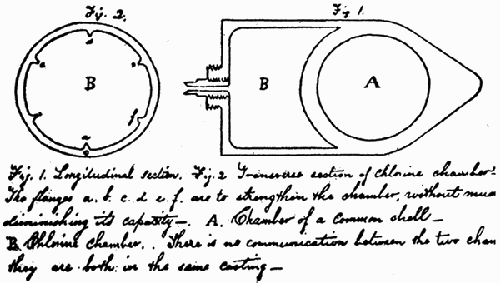
This is remarkable: In 1862, U.S. Secretary of War Edwin Stanton received a letter proposing the use of chlorine gas against the Confederate army, an idea 50 years ahead of its time. The inventor was John W. Doughty of New York City:
Sir
The above is a representation of a projectile which I have devised to be used as a means for routing an entrenched enemy. Believing it to be new and valuable, I send the War Department a brief description: Chlorine is a gas so irritating in its effects upon the respiratory organs, that a small quantity diffused in the atmosphere, produces incessant & uncontrollably violent coughing.It is 2 1/2 times heavier than the atmosphere, and when subjected to a pressure of 60 pounds to the inch, it is condensed into a liquid, its volume being reduced many hundred times. A shell holding two or three quarts, would therefore contain many cubic feet of the gas.
If the shell should explode over the heads of the enemy, the gas would, by its great specific gravity, rapidly fall to the ground: the men could not dodge it, and their first intimation of its presence would be by its inhalation, which would most effectually disqualify every man for service that was within the circle of its influence; rendering the disarming and capturing of them as certain as though both their legs were broken.
The War Department, which was flooded with well-meant but impractical suggestions, let this one go, and chlorine gas would not appear on the battlefield until Ypres in 1915.
“Experiment alone can determine whether this shell has any practical merit,” Doughty had written. “Possibly, I overrate its value; but it must not be forgotten, that while it does the work of an ordinary shell, it also carries with it a force against whose effect the most skillful military engineering can not possibly make any adequate provision.”
“As to the moral question involved in its introduction, I have, after watching the progress of events during the last eight months with reference to it, arrived at the somewhat paradoxical conclusion, that its introduction would very much lessen the sanguinary character of the battlefield, and at the same time render conflicts more decisive in their results.”
